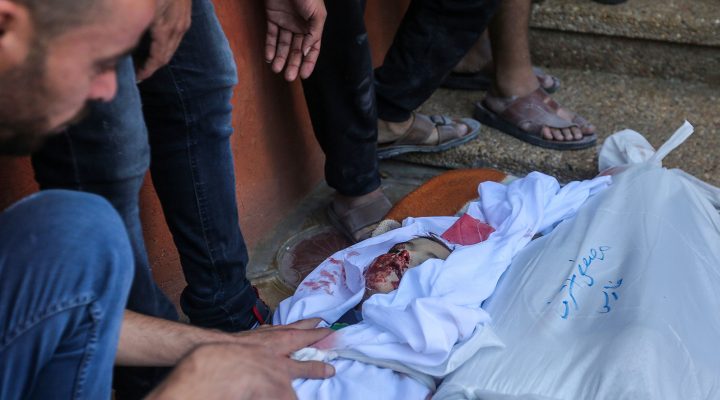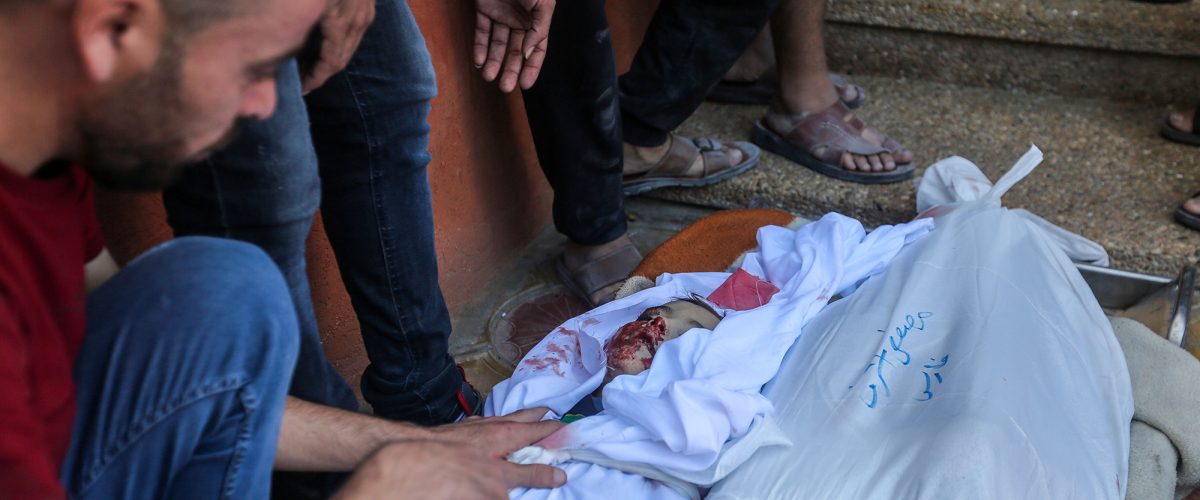What we have witnessed in the Holy Land is a catastrophe, and Christians must do our part to end the violence.
The terrorist attacks by Hamas against Israelis on Oct. 7 were abominable. This month’s long war in Gaza, which has resulted in more than 10,000 Palestinians dead, and almost half being reported as children, has been catastrophic.
Settler violence has increased against Palestinians in the West Bank. Antisemitism and Islamophobia are rising around the world. For these reasons, there has been a groundswell of people from around the world calling for a ceasefire in Gaza.

Darrell Hamilton II
Recently, I participated and led an interfaith coalition of faith leaders to do a pray-in at the Massachusetts offices of Sens. Elizabeth Warren and Ed Markey. Our message was not to echo the sentiment of theirs and others in Congress for a “humanitarian pause.” Rather, our appeal was for them to join numerous international agencies as well as a majority of American citizens in saying a ceasefire must happen to prevent an even larger humanitarian catastrophe.
Necessary moral solution
Ceasefire is not only the necessary political and military solution to bring an end to the bombardment and brutality we have observed in Gaza. It is the necessary moral solution to end the catastrophe in the Holy Land if there is ever going to be hope for Palestinians and Israelis to co-exist equally within the land.
The terrorist attacks by Hamas were not the beginning of the catastrophe in the Holy Land. Rather, catastrophe first befell in 1948 when establishment of the state of Israel resulted in the displacement and dispossession of Palestinians from their land.
Since the 1967 war, Palestinians have lived in exile, occupation and internationally recognized apartheid conditions. Israeli settlements have continued to be built in the West Bank in violation of international law. Palestinians live daily under surveillance, threats, harassment and abuse by the Israeli military and settlers. Palestinians have no freedom of movement or self-determination.
Violation of international law and human rights abuses in Palestine are some of the worst-kept secrets on the international stage. At best, Palestinians’ experiences are virtually ignored by the rest of the world as we feign a blind eye to their struggle. Or, at worst, they are maligned as terrorists by Western media and conscripted to carry primary responsibility for their plight. Nevertheless, the living conditions for those trapped in the Gaza Strip are harsher than for a majority of Palestinians, generally.
In their 2021 book, Except for Palestine: The Limits of Progressive Politics, Marc Lamont Hill, a prominent journalist on Palestine, and Mitchell Plitnick outlined:
Since the 1967 war, Gaza has been the hardest hit of any Palestinian territory. Egypt and Israel have maintained a blockade on the Strip, devasting an already distressed economy for nearly two decades. At the same time, periodic Israeli attacks have decimated Gaza’s poor and fragile infrastructure. With only 4% potable water, electricity access that is limited to four hours per day, 50% unemployment, and the looming threat of Israeli bombs, Gaza constitutes one of the most pressing humanitarian crises in the world.
My colleague Ashlee Wiest-Laird also details about the Gaza Strip:
Of the 2.1 million people living in the Gaza Strip, two-thirds are refugees from areas that were incorporated into the state of Israel in 1948. Not only have they been denied the right to return to their homes, but since the Oslo Accords they and their Gazan neighbors have effectively been prisoners of war. Trapped on a tiny piece of land, chronically denied water, electricity and economic development, Gazans endure the worst of the Palestinian experience.
After the assassination of Israeli Prime Minister Yitzhak Rabin by a Jewish extremist in 1995, there has been no substantive and promising push for a two-state solution in the Holy Land. Thus, based on the continued experiences of Palestinians in the occupied West Bank and Gaza, it would be reasonable to conclude that equal co-existence between Palestinians and Israelis has not been the end goal for long-term solution.
Christian culpability
And Christians bear much culpability in this regard. Christian Zionism has served as a strange bedfellow to Jewish Zionism — both making use of the other as a means toward their own political and theological ends for the future for the Holy Land.
“Christian Zionism has served as a strange bedfellow to Jewish Zionism.”
Christian Zionists profess Israel’s war with Hamas serves as a necessary apocalyptic precursor to Christ’s Second Coming, whose return will mark the establishment of his kingdom on earth as the New Jerusalem and complete the subsequent supersessionism of the church as the New Israel.
Moreover, even non-Zionist Christians, who nonetheless hold a theology of the Holy Land as being the blessed inheritance of the Jewish people, are complicit in the catastrophe that has unfolded since 1948.
There are those who attempt to paint the continuing conflict in the Middle East as the outgrowth of an ancient intrafamilial conflict between the sons of Abraham — Ishmael and Isaac. The basis of our inherited theology being that Isaac is the “promised son of Abraham” serving to legitimate in our eyes the subordination of Palestinian Muslims and Palestinian Christians in relation to Jewish people.
But the true culprit has been, and continues to be, more than a century of political engineering by the Western imperial interests to secure an economic hold in the Middle East. The same Western imperial interests that wish to wash their hands of responsibility for nefarious and disingenuous political dealings with both Jews and Palestinians, as well as exploitation of a legacy of trauma that has been inherited by the descendants of Abraham in the region.
Thus, it would be moral and theological malpractice for Christians to call for a ceasefire between Israel and Hamas but not go further in acknowledging our complicity in the violence. Contacting our representatives is not enough to end the violence, lest we also heed the call for collective repentance for the centuries of violence our theology has endorsed and facilitated.
Hearing the Bible again
And that starts with our reading of Scripture and God’s promise to Abram in Genesis. The crux of God’s promise to Abram is more than a division of inherited land. God’s promise hinges on the blessing of descendants to Abram who will inherit what God has given (Genesis 12:7; 13:15). And our Christian tradition says through faith we have been grafted into the family of Abraham so that we, too, are partakers in the promises of God through Abraham to his descendants (Romans 8:15-17).
“God has given much more than land that has been defiled and desecrated by the spilling of blood of God’s children.”
What God has given Abraham are descendants who, as the Bible says, will be as numerous as the stars in the sky and the sand on the seashore. Descendants who each know the deep trauma and pain of experiencing exile, persecution and occupation for generations.
Yes, God has promised land. But God has given much more than land that has been defiled and desecrated by the spilling of blood of God’s children. What God has given, and what we are being challenged to see, is the blessed promise of God is the promise of one another who, despite our disparate histories and experiences, nonetheless must come to recognize the shared dignity we each owe to another.
Christians must lead the call for a ceasefire to end the month’s long violence between Israel and Hamas. But the only way to bring an end to this catastrophe is for all the descendants of Abraham to co-exist together as equals in the land and equals to all that God has given.
Darrell Hamilton II serves as administrative pastor at First Baptist Church of Jamaica Plain, Mass., and as Protestant chaplain at Babson College in Wellesley, Mass. He is an ordained Baptist minister and graduate of Wake Forest School of Divinity. His ministry and leadership are focused on advancing diversity, inclusion and advocacy for the vulnerable and marginalized to inspire greater justice and love for all people.
Related articles:
In this war, there are no ‘good guys’ | Analysis by Mark Wingfield
If you’re uncertain how to approach Israel and Gaza, start with grief | Opinion by Cody Sanders
More violence will not produce peace | Opinion by Wendell Griffen


